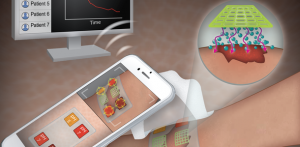The University of Victoria (UVic) is known for creating innovative solutions to tackle common problems seen in industry and community. UVic thrives on a collaborative team environment to bring novel technologies to market. The UVic Research Partnerships office supports faculty, staff and students to develop meaningful and successful industry-academia partnerships. Over the years, UVic has had many success stories arise from the Research Partnerships office as teams from across the university and industry work together to bring novel technologies to market. Here we highlight a few key success stories from start-ups to licensed technologies.
4M BioTech — GelDerm: Smart Bandage for Chronic Wound Management
Dr. Mohsen Akbari, Associate Professor at the University of Victoria, has co-founded 4M BioTech. The company has developed and licensed GelDerm, a hydrogel-based dressing that detects bacterial infections in wounds using sensors that change colour in response to infection.  This novel solution works in conjunction with an app where the user can take a picture of the wound for an objective reading of colour changes associated with the extent of infection. This solution provides an opportunity for remote monitoring of wounds and reduces the need for patients to visit the clinic. Commercialization of this technology could provide AI-powered telemedicine and offer better patient outcomes through effective wound management.
This novel solution works in conjunction with an app where the user can take a picture of the wound for an objective reading of colour changes associated with the extent of infection. This solution provides an opportunity for remote monitoring of wounds and reduces the need for patients to visit the clinic. Commercialization of this technology could provide AI-powered telemedicine and offer better patient outcomes through effective wound management.
Axolotl Biosciences — Novel Neurobioink
Dr. Stephanie Willerth, Professor at the University of Victoria, and her team have founded Axolotl Bioscience. Axolotl Biosciences provides turn-key reagents, including bioinks, 3D tissue models, and consulting services in the field of 3D bioprinting to advance tissue engineering and regenerative medicine. The  company develops novel fibrin-based bioink that generate stable and reproducible 3D-structures. A key novel function of this innovation is the ability of the structures to remain in culture for over 30 days while maintaining a high level of cell viability and function. The technology supports a wide range of cell lines, such as induced pluripotent stem cells (hiPSCs), neural progenitor cells (NPCs), and the mesenchymal stem cells (MSCs). The applications of the novel bioink are vast including drug modeling, screening, and development of cell therapies. Axolotl Biosciences has partnered with the Elvira Lab at UVic to investigate “3D bioprinting personalized brain tissue models”. An example of one of the many partnerships Axolotl Biosciences has developed since it was founded in 2020.
company develops novel fibrin-based bioink that generate stable and reproducible 3D-structures. A key novel function of this innovation is the ability of the structures to remain in culture for over 30 days while maintaining a high level of cell viability and function. The technology supports a wide range of cell lines, such as induced pluripotent stem cells (hiPSCs), neural progenitor cells (NPCs), and the mesenchymal stem cells (MSCs). The applications of the novel bioink are vast including drug modeling, screening, and development of cell therapies. Axolotl Biosciences has partnered with the Elvira Lab at UVic to investigate “3D bioprinting personalized brain tissue models”. An example of one of the many partnerships Axolotl Biosciences has developed since it was founded in 2020.
Solaries TM — Innovative Solar Cell Technology
Dr. Sam Sahar, UVic Alumni of Rustom Bhiladvala’s lab, has co-founded Solaries Enterprise Inc. SolariesTM products address the limitations found in traditional solar technologies. These products include two solar based technologies, Solar InkTM and Solar Cells. Solar InkTM is a novel development of perovskite film with high energy conversion efficiency and high stability. This novel ink is compatible with different fabrication processes including spin coating, slot-die and blade-coating. SolariesTM Solar Cells use an emerging solar technology called perovskite. The perovskite solar cells are lightweight, flexible, high efficiency and transparent. These solar cells are top quality, and cost effective to provide greater accessibility to end-users. Not only are these solar cells more effective than their competitors, the carbon footprint to develop SolariesTM solar cells is significantly less when compared to traditional solar cells. Solaries is partnered with the Saidaminov lab and previously partnered with the Evins lab at UVic to further their research goals.
with different fabrication processes including spin coating, slot-die and blade-coating. SolariesTM Solar Cells use an emerging solar technology called perovskite. The perovskite solar cells are lightweight, flexible, high efficiency and transparent. These solar cells are top quality, and cost effective to provide greater accessibility to end-users. Not only are these solar cells more effective than their competitors, the carbon footprint to develop SolariesTM solar cells is significantly less when compared to traditional solar cells. Solaries is partnered with the Saidaminov lab and previously partnered with the Evins lab at UVic to further their research goals.
IntegritE-DNATM — Quantitative real-time polymerase chain reaction (qPCR) for analysis of environmental DNA
Dr. Caren Helbing, Professor of Biochemistry and Microbiology at the University of Victoria, has developed an IntegritE-DNATM test to provide solutions to the issues found in common environmental DNA (eDNA) tests. The novel IntegritE- DNATM technology requires only a scoop of water from the target area. The test can be used on water, soil, and sediment samples. This non-invasive test is used to protect species at risk, particularly those that are more elusive, and their habitats. Through licensing and collaboration agreements this technology is helping our partners, such as Hemmera and Bureau Veritas, expand their testing toolkits and offer an opportunity to enhance Industry’s understanding of species at risk.
DNATM technology requires only a scoop of water from the target area. The test can be used on water, soil, and sediment samples. This non-invasive test is used to protect species at risk, particularly those that are more elusive, and their habitats. Through licensing and collaboration agreements this technology is helping our partners, such as Hemmera and Bureau Veritas, expand their testing toolkits and offer an opportunity to enhance Industry’s understanding of species at risk.
The UVic Research Partnership Office works with inventors from the idea/disclosure phase through the patent process to commercialization. It takes a community to bring innovative technologies to reality and UVic Research Partnerships is here to help your team.
If you have an innovative idea and would like to work with the UVic Research Partnerhips office, feel free to connect with us here: researchpartnerships@uvic.ca
Written by Liz Bueckert. Edited by the UVic ILO Team.
